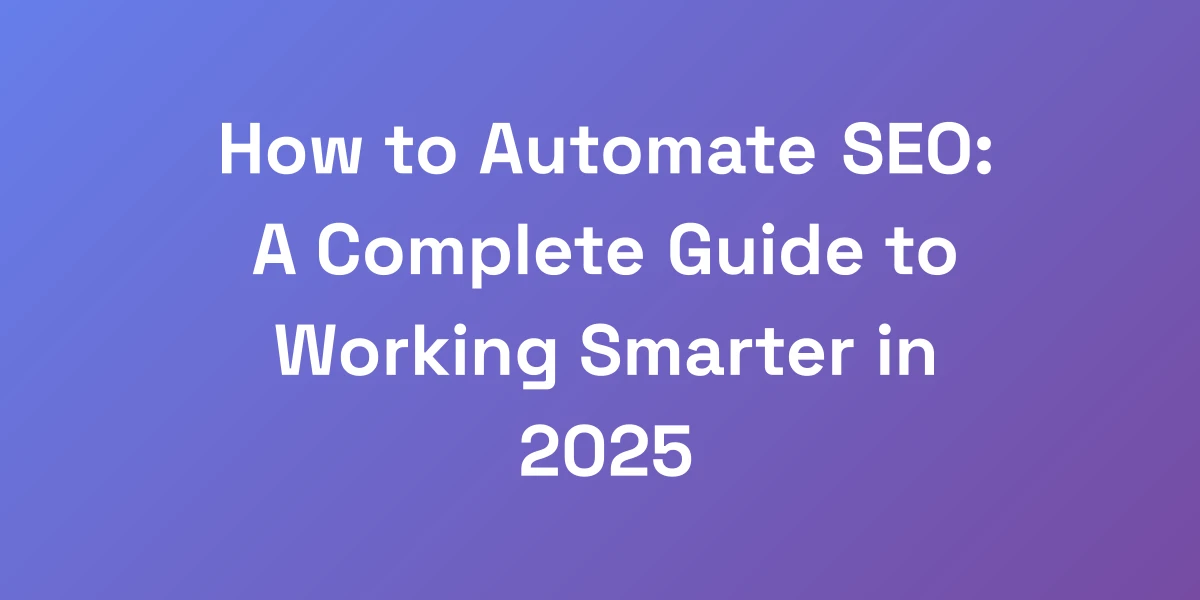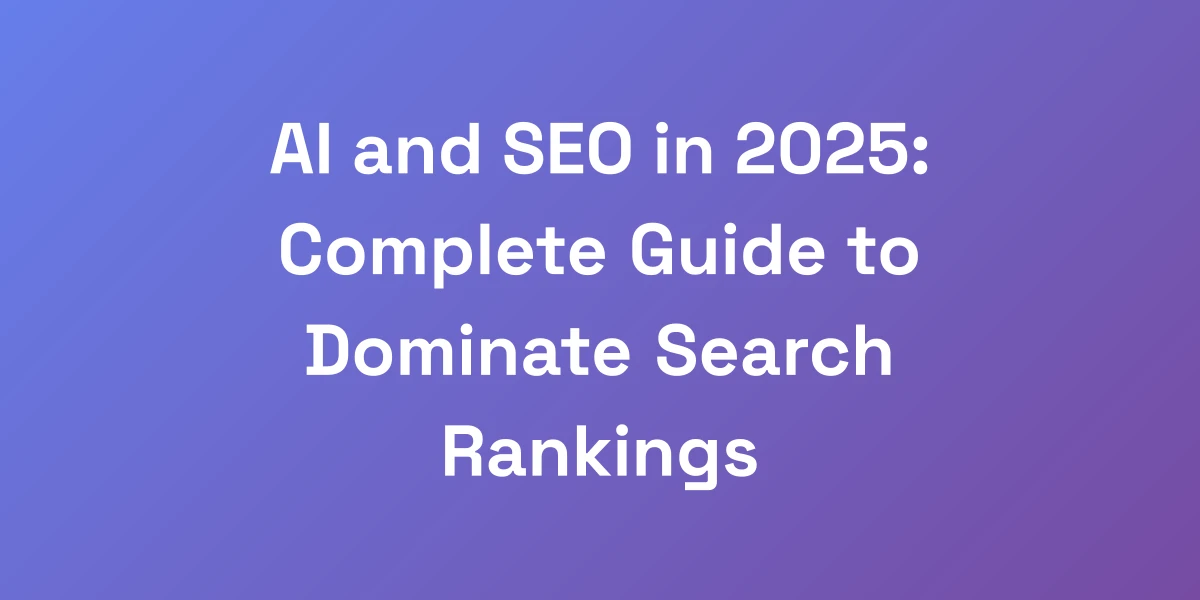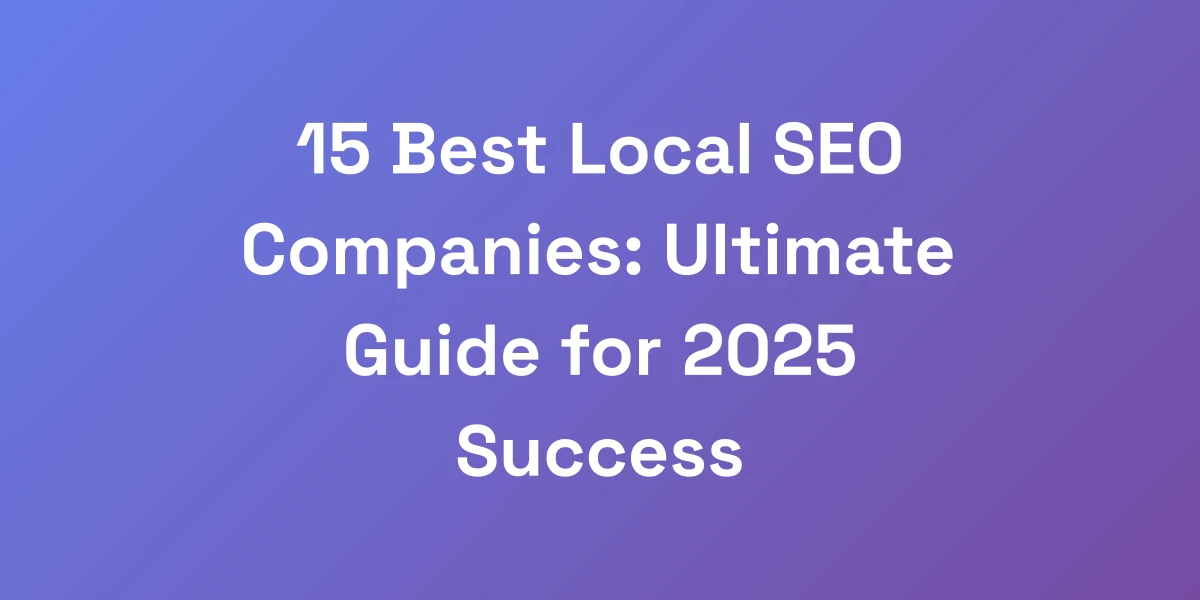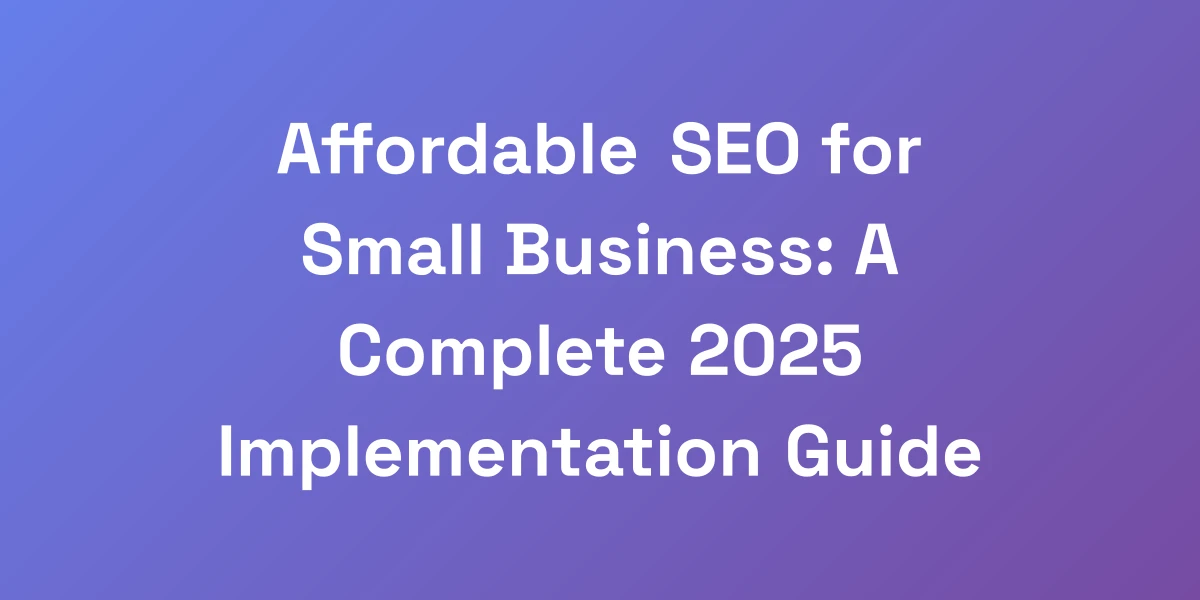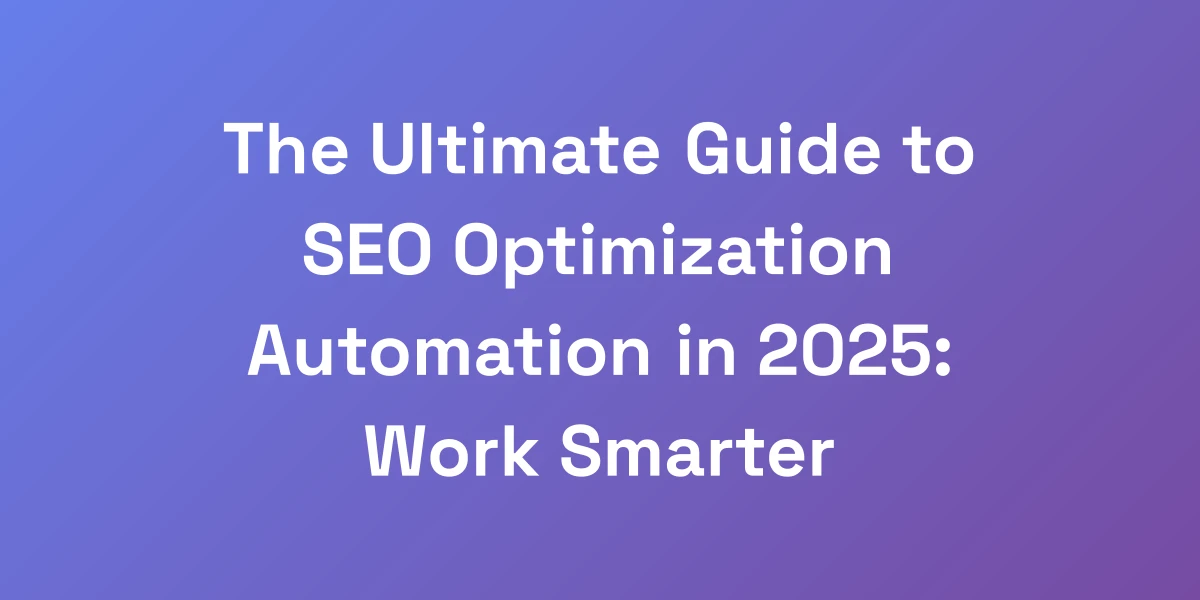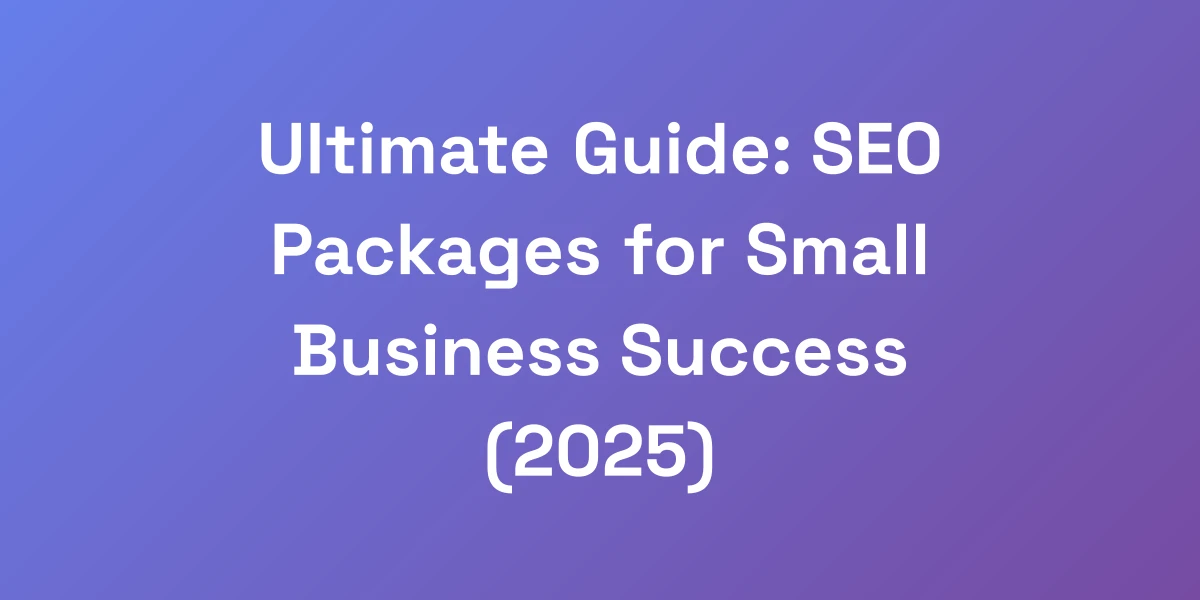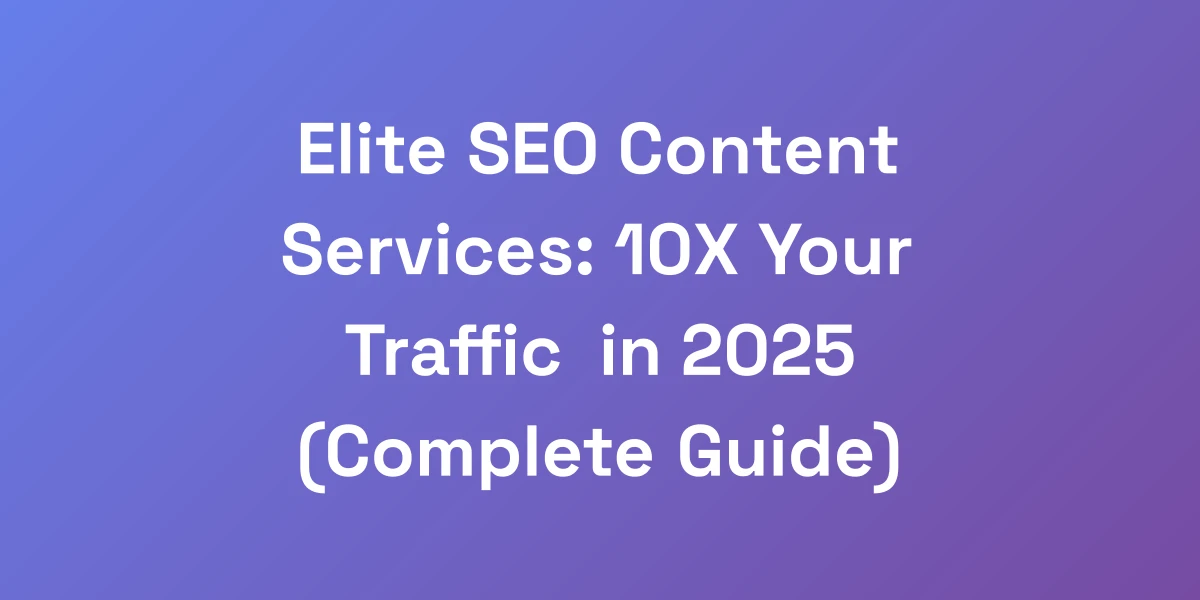
SEO Automation in 2025: A Complete Guide to AI-Powered Success
Feb 21, 2025 | By [email protected]
SEO Automation in 2025: A Complete Guide to AI-Powered Success
In the ever-evolving world of digital marketing, staying ahead of the curve is non-negotiable. SEO automation has emerged as a game-changer, revolutionizing how businesses approach their online presence. As we dive into 2025, the integration of AI-powered tools is not just an advantage—it’s a necessity.
But what exactly sets modern SEO automation apart from its predecessors? Gone are the days of simple keyword tracking and basic rank monitoring. Today, automation leverages sophisticated AI algorithms, transforming raw data into actionable insights that drive success.
The challenges are multifaceted. From keeping up with ever-changing search engine algorithms to managing vast amounts of data, businesses face myriad obstacles in achieving top search rankings. However, with the right automated strategies, these hurdles become manageable, propelling your SEO efforts to new heights.
We’re here to guide you through the intricacies of AI-powered SEO automation, ensuring you harness its full potential to dominate the search landscape in 2025.
Understanding Modern SEO Automation: Beyond Basic Tools
The landscape of SEO automation has evolved dramatically, moving far beyond simple keyword tracking and rank monitoring. Today’s AI-powered SEO automation represents a sophisticated ecosystem of tools and processes that can transform your digital marketing strategy.
From machine learning algorithms that predict search trends to automated content optimization systems, modern SEO automation combines efficiency with intelligence. However, it’s crucial to understand that automation isn’t about replacing human expertise – it’s about augmenting it to achieve better results with less manual effort.
The Evolution of SEO Automation Tools
SEO automation tools have come a long way from their initial inception. Early tools primarily focused on basic tasks like keyword tracking and backlink analysis. Today, they encompass a wide range of functionalities powered by AI and machine learning.
Tools like Ahrefs, SEMrush, and Yoast SEO have integrated advanced features such as predictive analytics, automated content suggestions, and real-time algorithm updates. These enhancements allow marketers to not only track but also anticipate changes in the SEO landscape, ensuring proactive strategy adjustments. For more insights on the latest tools, check out the 15 Best Auto SEO Tools That Actually Boost Rankings in 2025.
Key Components of Modern SEO Automation
Modern SEO automation is built on several key components that work in harmony to optimize your website’s performance:
- Keyword Research and Clustering: AI tools can identify trending keywords and group them into clusters for targeted optimization.
- Technical SEO Audits: Automated systems scan your website for technical issues, ensuring it meets search engine standards.
- Content Optimization: AI-driven tools suggest improvements for your content, enhancing relevance and readability.
- Link Building: Automation streamlines the process of acquiring high-quality backlinks, essential for authority building.
- Performance Tracking: Real-time monitoring of key metrics helps in assessing the effectiveness of your SEO strategies.
The Role of AI in Contemporary SEO
AI plays a pivotal role in modern SEO automation by processing vast amounts of data and extracting meaningful insights. Machine learning algorithms can analyze user behavior, predict search trends, and identify opportunities for optimization that would be impossible to detect manually.
For instance, AI can predict which keywords are likely to gain popularity, allowing you to create content that aligns with future search trends. Additionally, AI-powered tools can personalize user experiences by tailoring content based on individual preferences and behaviors. To explore more about how AI is reshaping SEO, visit AI and SEO: The Ultimate Guide to Mastering Search in 2024.
Benefits and Limitations of Automated SEO
Automated SEO offers numerous benefits, including:
- Efficiency: Automating repetitive tasks saves time, allowing marketers to focus on strategic initiatives.
- Accuracy: AI reduces human error, ensuring data-driven decisions are based on accurate information.
- Scalability: Automation enables handling large volumes of data and tasks, essential for growing businesses.
However, it’s not without limitations:
- Lack of Creativity: Automated tools may struggle with tasks requiring creative input, such as content creation.
- Dependence on Data: The effectiveness of AI tools depends on the quality and quantity of available data.
- Initial Setup: Implementing automated systems can be resource-intensive initially, requiring time and investment.
Real-world Applications and Use Cases
Real-world applications of SEO automation span various industries and use cases. For example, e-commerce platforms use automated tools to optimize product listings and manage large inventories efficiently. Content marketers leverage AI to generate topic ideas and optimize articles for search engines.
A notable use case involves Merchynt, which utilizes AI to offer solutions like auto-generation of optimized review responses and business descriptions. This showcases how AI can handle specific SEO tasks, enhancing overall performance without manual intervention. For more insights on AI-powered SEO strategies, check out Merchynt’s AI-powered SEO solutions.
Essential SEO Tasks You Should Automate Today
Identifying the right tasks for automation can significantly impact your SEO efficiency. Smart automation focuses on repetitive, data-driven tasks that computers excel at handling. From technical SEO audits to keyword research and rank tracking, numerous processes can benefit from automation.
The key is selecting tasks where automation provides clear advantages in terms of speed, accuracy, and scalability, while maintaining the quality standards that search engines demand.
Technical SEO Auditing and Monitoring
Technical SEO is the backbone of any successful SEO strategy. Automated technical SEO audits ensure that your website adheres to essential standards, improving its ability to rank. Tools like Ahrefs and SEMrush can systematically scan your site for issues like broken links, duplicate content, and page speed problems.
Actionable Tips:
- Schedule regular automated audits to continuously monitor site health.
- Prioritize fixing critical issues flagged by these tools to maintain optimal performance.
- Integrate audit results with your project management system for streamlined issue resolution.
Keyword Research and Clustering
Keyword research remains a fundamental aspect of SEO. Automation tools can swiftly analyze vast datasets to identify high-potential keywords and group them into relevant clusters.
Actionable Tips:
- Use AI-driven tools to uncover long-tail keywords that might be overlooked manually.
- Cluster keywords based on intent and relevance to create comprehensive content strategies.
- Monitor keyword performance continuously and adjust your focus based on real-time data.
Content Performance Tracking
Understanding how your content performs is crucial for refining your SEO strategy. Automated tracking tools provide insights into metrics like page views, bounce rates, and conversion rates.
Actionable Tips:
- Set up automated reports to receive regular updates on content performance.
- Identify top-performing content and analyze the factors contributing to its success.
- Replicate successful strategies across other content pieces to maximize reach and engagement.
Competitor Analysis Automation
Keeping an eye on competitors is essential for maintaining a competitive edge. Automated competitor analysis tools can track your rivals’ keyword strategies, backlink profiles, and content performance.
Actionable Tips:
- Use tools like Ahrefs to monitor competitor backlinks and identify potential link-building opportunities.
- Analyze competitors’ top-performing content to understand what resonates with your target audience.
- Adjust your SEO strategy based on competitor insights to stay ahead in the rankings.
Link Building and Monitoring
Building a strong backlink profile is pivotal for SEO success. Automated link building tools streamline the process of finding and acquiring high-quality backlinks.
Actionable Tips:
- Utilize AI tools to identify authoritative websites for potential backlinks.
- Automate outreach campaigns to save time and enhance efficiency.
- Monitor backlink health regularly to identify and disavow harmful links that could negatively impact your SEO.
Automated Reporting Systems
Automated reporting systems are invaluable for tracking the effectiveness of your SEO strategies. These systems compile data from various tools and present it in a coherent, actionable format.
Actionable Tips:
- Create custom dashboards that highlight key SEO metrics relevant to your goals.
- Schedule automated report generation to keep stakeholders informed without manual intervention.
- Use these reports to identify trends, measure ROI, and make data-driven decisions.
Implementing AI-Powered SEO Tools Effectively
Successfully integrating AI-powered SEO tools requires a strategic approach and careful consideration of your specific needs. The market offers numerous solutions, from comprehensive platforms to specialized tools focusing on specific aspects of SEO.
Understanding how to evaluate, select, and implement these tools is crucial for maximizing their potential. This section explores the practical aspects of tool selection, integration strategies, and best practices for implementation.
Evaluating SEO Automation Tools
Selecting the right SEO automation tools involves assessing several factors to ensure they align with your business objectives. Consider the following when evaluating tools:
- Functionality: Identify the core features you need, such as keyword research, backlink analysis, or content optimization.
- Integration: Ensure the tool can seamlessly integrate with your existing systems and other marketing tools.
- Usability: Choose tools with user-friendly interfaces and robust customer support to facilitate smooth adoption.
- Scalability: Select tools that can grow with your business, handling increased data and complexity as needed.
- Cost: Evaluate the pricing structure to ensure it fits within your budget while delivering expected ROI.
Integration Best Practices
Integrating AI-powered SEO tools into your existing workflow requires careful planning to avoid disruptions and maximize efficiency.
Best Practices:
- Start with a clear implementation plan outlining the steps and timeline for integration.
- Ensure data consistency by standardizing formats across all integrated tools.
- Provide training to your team to ensure they understand how to use the new tools effectively.
- Monitor the integration process closely to identify and address any issues promptly.
Setting Up Automated Workflows
Automated workflows streamline your SEO processes, making them more efficient and less prone to errors.
Actionable Tips:
- Map out your SEO processes to identify which tasks can be automated.
- Use workflow automation tools to connect different SEO tools, ensuring seamless data flow.
- Regularly review and optimize your workflows to adapt to changing SEO needs and tool updates.
Training Team Members
Effective training ensures your team can fully leverage the capabilities of AI-powered SEO tools.
Actionable Tips:
- Provide comprehensive training sessions covering tool functionalities and best practices.
- Create documentation and resources for ongoing reference and support.
- Encourage continuous learning and knowledge sharing among team members to stay updated with tool advancements.
Measuring Automation ROI
Assessing the return on investment (ROI) from SEO automation is essential to justify the expenses and optimize your strategies.
Actionable Tips:
- Define clear KPIs, such as increased organic traffic, improved rankings, and higher conversion rates.
- Track these metrics before and after implementing automation to gauge its impact.
- Adjust your strategies based on the ROI data to enhance efficiency and effectiveness.
Common Implementation Challenges
Implementing AI-powered SEO tools can come with its set of challenges. Being aware of these can help you navigate them effectively.
Common Challenges:
- Resistance to Change: Teams may be hesitant to adopt new tools and workflows.
- Data Integration Issues: Integrating various tools can lead to compatibility and data consistency issues.
- Cost Constraints: Budget limitations can restrict access to premium tools and features.
- Skill Gaps: Lack of expertise in using advanced SEO tools can hinder their effective utilization.
Addressing these challenges involves strategic planning, effective communication, and ongoing support to ensure successful implementation.
Advanced SEO Automation Strategies for 2025
As we move further into 2025, advanced SEO automation strategies are becoming increasingly sophisticated. From predictive analytics to automated content optimization, new technologies are reshaping how we approach SEO.
Understanding and implementing these cutting-edge strategies can give you a significant competitive advantage. This section explores the latest trends and techniques in SEO automation, focusing on practical applications and real-world results.
Predictive SEO Analytics
Predictive analytics uses historical data and AI to forecast future trends in search behavior. This allows businesses to anticipate changes and adjust their strategies proactively.
Actionable Tips:
- Leverage AI tools to analyze past performance data and predict future keyword trends.
- Use these insights to create content that aligns with upcoming search trends.
- Adjust your SEO strategies based on predictive insights to stay ahead of the competition.
Automated Content Optimization
Automated content optimization tools analyze and enhance your content to improve its search engine performance. These tools provide recommendations on keyword usage, readability, and overall content structure.
Actionable Tips:
- Integrate AI-powered editors to receive real-time content optimization suggestions.
- Ensure your content aligns with SEO best practices by following the tool’s recommendations.
- Regularly update your content based on optimization insights to maintain its relevance and ranking.
AI-Driven SERP Analysis
AI-driven SERP analysis tools provide deep insights into search engine results pages. These tools analyze the top-ranking pages to identify patterns and factors contributing to their success.
Actionable Tips:
- Use SERP analysis tools to understand the key elements that make top-ranking pages successful.
- Incorporate these elements into your content strategy to enhance your chances of ranking higher.
- Continuously monitor SERP dynamics to adapt your SEO tactics as needed.
Automated Schema Markup
Schema markup helps search engines understand your content better, enhancing the likelihood of appearing in rich snippets and other SERP features.
Actionable Tips:
- Utilize automated tools to generate and implement schema markup on your website.
- Ensure your schema types are correctly applied to relevant content pages.
- Monitor the impact of schema markup on your search visibility and make adjustments as necessary.
Voice Search Optimization
With the rise of voice-activated devices, optimizing for voice search is becoming increasingly important. AI-powered tools can help tailor your SEO strategy to accommodate voice search queries.
Actionable Tips:
- Focus on natural language and conversational keywords that mimic how people speak.
- Optimize your content for featured snippets, as they are often used for voice search responses.
- Ensure your website is mobile-friendly and loads quickly, as these factors influence voice search rankings.
Mobile SEO Automation
As mobile usage continues to dominate, optimizing your website for mobile SEO is critical. Automated tools can help ensure your site is mobile-friendly and performs well on all devices.
Actionable Tips:
- Use automated mobile SEO tools to conduct comprehensive mobile audits.
- Optimize page speed, ensure responsive design, and improve mobile usability based on tool recommendations.
- Monitor mobile performance metrics to continuously enhance user experience and search rankings.
Maintaining the Human Touch in Automated SEO
While automation brings numerous benefits, maintaining the human element in your SEO strategy is crucial for long-term success. The most effective approaches combine automated efficiency with human creativity and strategic thinking.
Understanding where to draw the line between automation and human intervention ensures your SEO efforts remain both efficient and authentic. This balance is essential for creating content that resonates with both search engines and human readers.
Balancing Automation and Manual Input
Automation handles the repetitive, data-driven aspects of SEO, but human oversight is necessary to guide strategy and ensure quality.
Actionable Tips:
- Delegate routine tasks like keyword tracking and technical audits to automated tools.
- Focus your creative efforts on content creation, strategy development, and engaging with your audience.
- Regularly review automated outputs to ensure alignment with your overall SEO goals and quality standards.
Quality Control in Automated Processes
Automated processes can sometimes lead to errors or subpar outputs if not properly managed. Implementing quality control measures ensures that automation enhances rather than hinders your SEO efforts.
Actionable Tips:
- Regularly audit automated reports and data to identify and rectify inaccuracies.
- Set up alerts for critical issues that require immediate human intervention.
- Establish clear protocols for reviewing and approving automated content and optimizations.
Creative Elements That Can’t Be Automated
While AI excels at data analysis and pattern recognition, certain creative aspects of SEO require a human touch. Crafting compelling narratives, developing unique brand voices, and fostering authentic engagement are areas where humans shine.
Actionable Tips:
- Use automation for data-driven tasks, freeing up time for creative endeavors.
- Incorporate human creativity in content creation to ensure it resonates emotionally with your audience.
- Encourage brainstorming sessions and creative collaborations to innovate and differentiate your content.
Human Oversight in Decision Making
Decisions that shape the strategic direction of your SEO efforts should involve human judgment. While AI provides valuable insights, humans must interpret and act on these insights effectively.
Actionable Tips:
- Leverage AI-generated data to inform your strategic decisions, but validate them with human expertise.
- Conduct regular strategy reviews to ensure your SEO efforts are aligned with business objectives.
- Encourage collaborative decision-making processes that integrate both AI insights and human intuition.
Building Authentic User Experiences
Authentic user experiences are paramount for SEO success. Automation can optimize technical aspects, but creating genuine connections with your audience requires a human touch.
Actionable Tips:
- Create content that addresses the needs and interests of your target audience.
- Engage with users through personalized interactions and responsive communication.
- Use automation to enhance user experience, such as by improving site speed and mobile usability, while ensuring content remains authentic and engaging.
Future of Human-AI Collaboration in SEO
The future of SEO lies in the seamless collaboration between humans and AI. As AI continues to advance, this partnership will become even more integral to achieving SEO success.
Actionable Tips:
- Stay updated with the latest AI advancements and integrate relevant technologies into your SEO strategy.
- Foster a culture of continuous learning and adaptation within your team to leverage AI effectively.
- Explore new ways to blend human creativity with AI efficiency, ensuring your SEO efforts remain innovative and effective.
Conclusion
As we navigate through 2025, the synergy between human expertise and AI-powered SEO automation is undeniable. The integration of advanced automation tools transforms how we approach SEO, enabling greater efficiency, accuracy, and scalability.
Key takeaways include the importance of selecting the right tools, balancing automated processes with human oversight, and embracing advanced strategies like predictive analytics and voice search optimization. By leveraging AI’s capabilities while maintaining the creative and strategic input of your team, you can achieve unparalleled SEO success.
Ready to elevate your SEO strategy? Implement AI-powered automation tools today and witness a transformation in your digital marketing efforts. Whether you’re refining technical SEO, optimizing content, or strategizing your link-building campaigns, automation is your gateway to sustained growth and competitive advantage. For an in-depth look at leveraging AI for SEO, visit How to Leverage AI for SEO. Additionally, explore AI for SEO in 2025: 12 Proven Tools & Strategies That Work for more insights.
What’s your experience with SEO automation? Share your thoughts and strategies in the comments below. Let’s drive success together!

